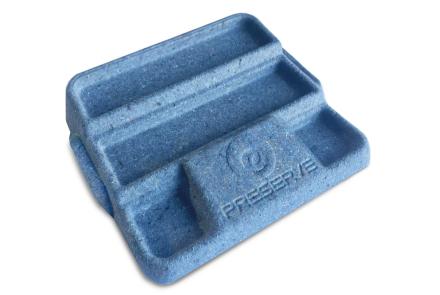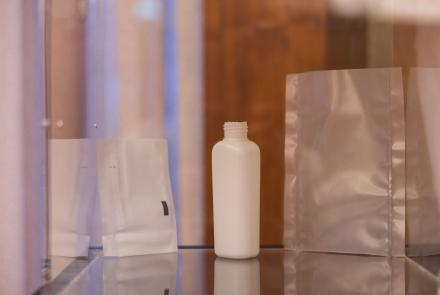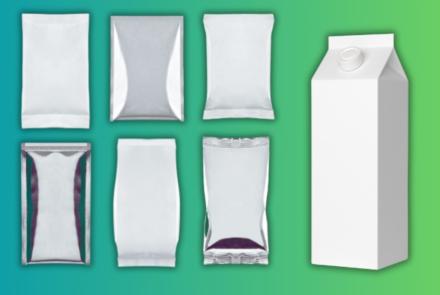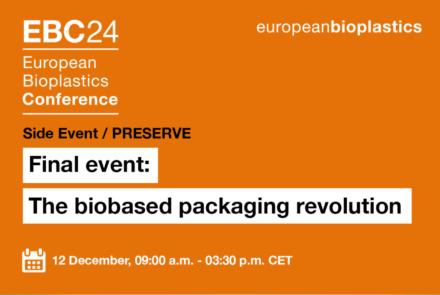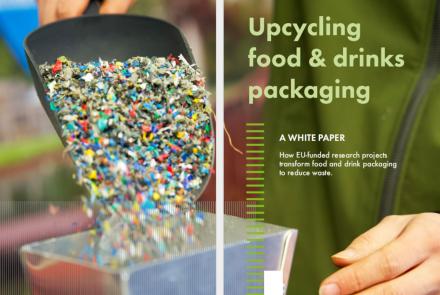White paper on upcycling food & drinks packaging: pioneering sustainable solutions
The food and drink industry, with a turnover of €1,112 billion in 2023, leads EU manufacturing and global exports. However, its reliance on plastic packaging has led to significant environmental challenges. The average European produced around 189 kg of packaging waste in 2021 – a little more than half a kilo per day per citizen – amounting to almost 85 million tonnes in the EU, with plastics constituting 19%. Despite progress, the sector faces substantial hurdles in achieving EU sustainability targets.
For this reason, various EU projects focused on sustainable packaging collaborated to promote knowledge for policymakers. Working throughout the entire value chain of food packaging, the PRESERVE, UPLIFT, upPE-T, BioSupPack, and MoeBIOS projects prepared a white paper that provides insights into advancing sustainable packaging solutions.
Upcycling food and drinks packaging: a white paper
The white paper “Upcycling food and drinks packaging: How EU-funded research projects transform food and drink packaging to reduce waste”, whose development has been coordinated by European Bioplastics, highlights the innovative technologies and materials developed by these four projects in circularity design, upcycling technologies and end-of-life options, and also provides targeted recommendations or EU policymakers and key stakeholders for the future.
The challenges identified revolve around three axes: Technological and Logistical challenges, Value Chain and Market integration, Regulatory and Compliance.
For technological and logistical challenges, transforming waste into higher-value products through biotechnology is promising but faces economic barriers. It is fundamental to invest in infrastructure, promote common standards and clear labels, as well as support innovation in recycling technologies.
As regards the value chain, circular solutions require clearly defined value chains and identification of key actors and economic viability of the upcycling process. It is fundamental to promote strategic industry collaboration and stakeholder engagement in the value chain definition as well as encourage public-private partnerships and facilitate the development of logistics and management frameworks.
Regulatory uncertainties, inconsistencies and disconnected EU regulatory framework do not help in boosting the innovation of the bio-based sector. It is recommended to harmonize policy frameworks, establish solid legislative and regulatory frameworks that encourage the development of new technologies and ensure the participation of relevant experts in intra-department discussions at the European Commission.
Overall, achieving these goals requires a collaborative effort among researchers, industry leaders, policymakers, and the public to drive innovation and foster a resilient, sustainable packaging sector.
The launch of the white paper
In order to underline the importance of collaborative efforts in writing the white paper, European Bioplastics organised an online event to launch the document: “Upcycling Packaging: a White Paper on EU Research Driving Sustainability”. In this event, held online on 1 October 2024 and whose recordings are available on YouTube, attendees could get a glimpse of the content of the white paper, presented by Estela López-Hermoso from European Bioplastics. The spotlight was also on the four EU-funded projects —PRESERVE, BioSupPack, upPE-T, and UPLIFT— which are revolutionizing food and drink packaging through innovative upcycling strategies.
Participants gained access to the latest discoveries of the four projects, explored the key challenges faced in their research and innovation endeavours, and learned about strategic recommendations aimed at upcycling up to 60% of food and drink packaging plastic waste by 2030. Attendees also got a glimpse into the new generation of EU-funded projects, including MoeBIOS.
Roberto Ferrigno, head of public affairs of European Bioplastics, also participated in the round table of discussion between the speakers of the event. Ferrigno underlined the importance of promoting market opportunities to boost innovative solutions developed by the projects. He also underlined the importance of involving consumers in the decision-making process, as they are aware of the challenges faced by the development of new solutions to reduce plastic waste.
Collaborating for a plastic-free future
Transforming by-products or waste into new, higher-quality materials is essential for preserving natural resources, reducing plastic packaging and lowering greenhouse gas emissions from fossil-based production. With this white paper, we want to give our contribution to a better future.
You can download the white paper from Zenodo and rewatch the webinar on YouTube.



